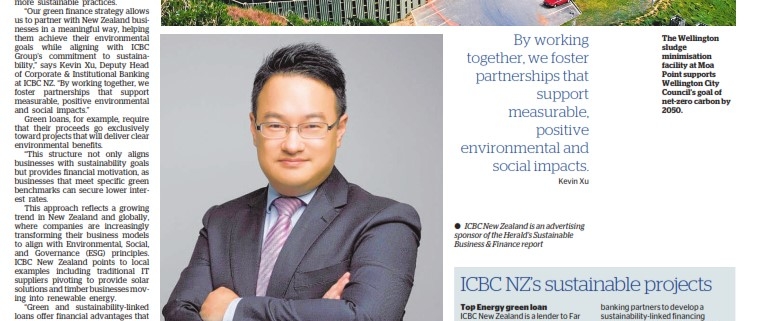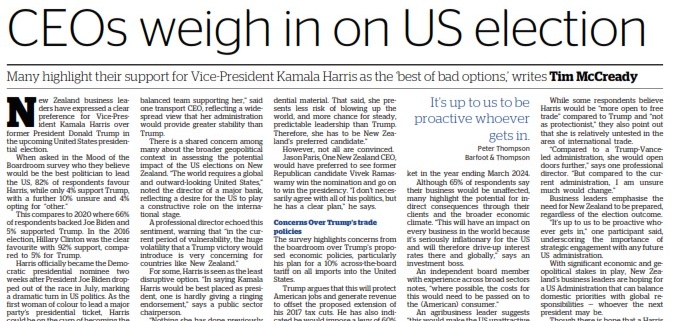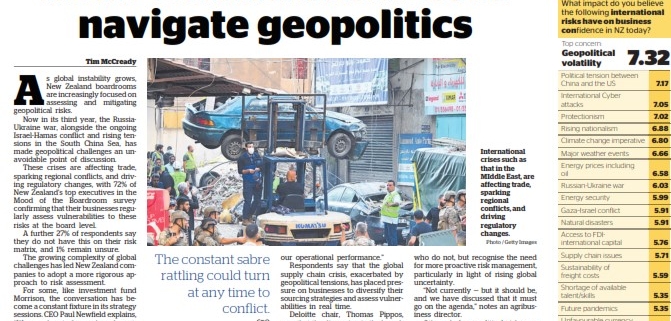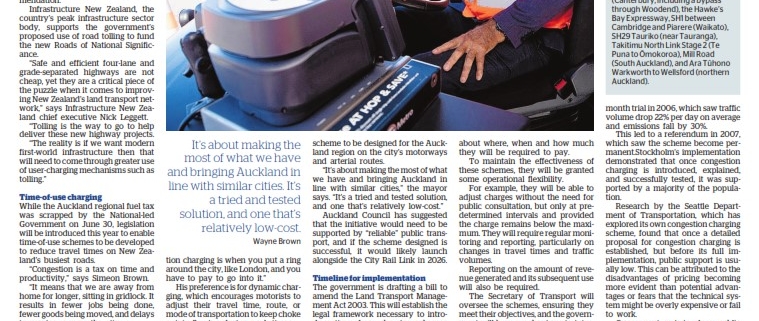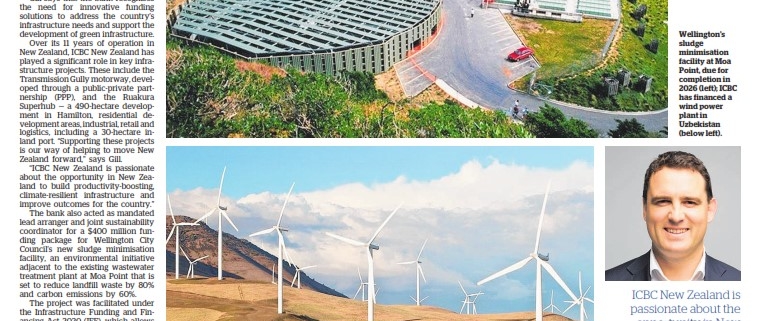Time-of-use charging
While the Auckland regional fuel tax was scrapped by the National-led Government on June 30, legislation will be introduced this year to enable time-of-use schemes to be developed to reduce travel times on New Zealand’s busiest roads.
“Congestion is a tax on time and productivity,” said Brown.
“It means that we are away from home for longer, sitting in gridlock. It results in fewer jobs being done, fewer goods being moved, and delays to services across the city.
“Faster, more reliable travel times will increase productivity, and lower costs for businesses and their customers. That is why we are enabling time-of-use schemes to be put in place.
“Enabling time-of-use schemes is a priority for our Government and a commitment under the National-Act Coalition Agreement.”
Brown stressed that time-of-use schemes will improve network efficiency to increase productivity and enable people and freight to get where they need to go quickly and safely – and that they are not about raising revenue.
“Any money collected through time-of-use charging will also be required to be invested back into transport infrastructure that benefits Kiwis and businesses living and working in the region where the money was raised. Councils will not be able to spend this money on other priorities or pet projects,” he said.
Auckland is set to be a focal point, with the Government prioritising working with Auckland Council. The city already faces severe traffic issues, with private vehicle travel accounting for nearly 75% of commuting across the Auckland region.
The Mayor of Auckland, Wayne Brown, has long been an advocate for time-of-use charging – a term he prefered over the broader “congestion charging”.
“What we’re talking about is time-of-use charging rather than congestion charging,” he explained. “Congestion charging is when you put a ring around the city, like London, and you have to pay to go into it.”
His preference is for dynamic charging, which encourages motorists to adjust their travel time, route, or mode of transportation to keep choke points flowing during peak times.
A 2020 Ministry of Transport report found that time-of-use charging could reduce congestion in Auckland by around 8-12% when fully implemented, similar to the traffic levels seen during the school holidays.
A 2017 report from the New Zealand Institute of Economic Research calculated the economic and social benefits to Auckland if the road transport network was operating at capacity Monday to Friday to be between $0.9 billion and $1.3b. If the average speed across the network was close or equal to the speed limit (free-flow), this benefit would be even greater – between $1.4b and $1.9b.
In June, Auckland Council’s transport and infrastructure committee approved a time-of-use charging scheme to be designed for the Auckland region on the city’s motorways and arterial routes.
“It’s about making the most of what we have and bringing Auckland in line with similar cities,” the mayor said. “It’s a tried and tested solution, and one that’s relatively low-cost.”
Auckland Council has suggested that the initiative would need to be supported by “reliable” public transport, and if the scheme designed is successful, it would likely launch alongside the City Rail Link in 2026.
Timeline for implementation
The Government is drafting a bill to amend the Land Transport Management Act 2003. This will establish the legal framework necessary to introduce time-of-use charging schemes aimed at managing road network demand. This is expected to be introduced to Parliament before the end of this year and will be reviewed by the Transport and Infrastructure Select Committee in 2025.
Once enacted, local authorities will be able to propose and develop time-of-use schemes in partnership with the New Zealand Transport Agency (NZTA), who will act as the majority partner. The Government, through the NZTA, will also have the authority to propose a scheme.
After a scheme is designed, it will be submitted to the Minister of Transport for approval, then implemented through an Order in Council with clear rules governing the scheme, providing road users with certainty about where, when and how much they will be required to pay.
To maintain the effectiveness of these schemes, they will be granted some operational flexibility.
For example, they will be able to adjust charges without the need for public consultation, but only at pre-determined intervals and provided the charge remains below the maximum. They will require regular monitoring and reporting, particularly on changes in travel times and traffic volumes.
Reporting on the amount of revenue generated and its subsequent use will also be required.
The Secretary of Transport will oversee the schemes, ensuring they meet their objectives, and the Government will have mechanisms to intervene if an approved scheme fails to deliver its anticipated objectives.
New York demonstrates the challenges
Congestion and time-of-use charging has been successfully implemented in many major cities around the world.
Singapore first introduced a congestion charge in 1975, requiring drivers to pay a flat fee to enter a restricted zone during peak hours, reducing congestion by 20%.
By 1998, it evolved into a fully automated electronic road pricing system, significantly reducing traffic, boosting public transportation usage and lowering emissions.
Stockholm introduced a seven-month trial in 2006, which saw traffic volume drop 22% per day on average and emissions fall by 30%.
This led to a referendum in 2007, which saw the scheme become permanent. Stockholm’s implementation demonstrated that once congestion charging is introduced, explained, and successfully tested, it was supported by a majority of the population.
Research by the Seattle Department of Transportation, which has explored its own congestion charging scheme, found that once a detailed proposal for congestion charging is established, but before its full implementation, public support is usually low. This can be attributed to the disadvantages of pricing becoming more evident than potential advantages or fears that the technical system might be overly expensive or fail to work.
Once a system is in place, public support generally increases, usually driven by the system working and people happy with the benefits, or their initial fears not being realised.
Nevertheless, overcoming initial fears will need to be carefully managed in any rollout in New Zealand, especially in times of economic pressure.
The recent experience of New York City’s implementation highlights this challenge. Despite years of preparation and the installation of necessary equipment, New York City’s congestion pricing plan – due to be rolled out on June 30 this year – was “indefinitely paused” by Governor Kathy Hochul on June 5.
The first-in-the-nation congestion pricing scheme, approved in 2019, would have seen cars charged $15 to enter a large swath of Manhattan.
Hochul slammed on the brakes at the last minute before its introduction due to concerns about the timing and state of the city’s post-pandemic recovery.
She said she feared New Yorkers could face “unintended consequences” if the plan was introduced.
The pause leaves the city’s public transport system without an additional $1b per year in funding, with delays expected for improvements in traffic congestion, air quality, and its dilapidated subway system.
It may also discourage other US cities from pursuing similar pricing initiatives that were looking to New York City’s implementation as a case study for their own rollout.
Government priorities
The Government is prioritising 17 Roads of National Significance, recently highlighted in the Government Policy Statement on Land Transport (GPS). The New Zealand Transport Agency is expected to begin procurement, enabling works, and construction of the first seven within the next three years.
- Takitimu North Link Stage 1, connecting Tauranga and Te Puna, is already under way, with construction on Ōtaki to North of Levin set to begin next year.
- The next phase of projects includes Belfast to Pegasus (Canterbury, including a bypass through Woodend), the Hawke’s Bay Expressway, SH1 between Cambridge and Piarere (Waikato), SH29 Tauriko (near Tauranga), Takitimu North Link Stage 2 (Te Puna to Ōmokoroa), Mill Road (South Auckland), and Ara Tūhono Warkworth to Wellsford (northern Auckland).
Research shows appetite for congestion charge
Aucklanders are up for a conversation on congestion pricing, or time-of-use charging.
Commissioned by policy and advocacy organisation the Northern Infrastructure Forum and delivered by Koi Tū: The Centre for Informed Futures, a think tank and research centre at the University of Auckland, research has explored the views of the community on congestion charging.
It found Aucklanders understand that what is happening now isn’t working, and new approaches need to be considered. While panel members surveyed supported congestion pricing in principle, they had some concerns. The research concluded:
- The primary objective of congestion charging must be to reduce congestion.
- There should be the strategic use of discounts and exemptions to mitigate social impacts.
- Revenue collected must be used exclusively to provide transport options for Aucklanders (particularly public transport options).
- Congestion charging should be kept simple and transparent.
That means: people need to know what they’re paying and when, with timing and pricing reviewed regularly; initial geographical boundary for the charging zone must not be too complex; it must be user friendly with reliable payment systems; there should be clear communication of benefits, particularly decongestion benefits.




